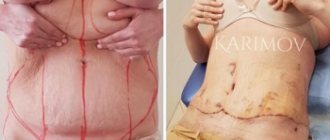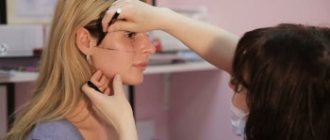Podgaisky Vladimir Nikolaevich
Defended doctoral dissertation:
Organizational and tactical aspects of microsurgery for replantation of limbs and their segments, 1997
Head of the microsurgical department of the Minsk Regional Clinical Hospital (Lesnoy-1 village), professor of the Department of Surgery of the BelMAPO, chief freelance plastic surgeon of the Ministry of Health of Belarus.
Areas of scientific interests: V. N. Podgaisky, for the first time in the Republic of Belarus, performed autotransplantation of complex flaps on microsurgical anastomoses, microvascular autotransplantation of bone, toes to the hand for fingerlessness, surgical gender reassignment for transsexualism, simultaneous phallourethroplasty for loss of the penis and in transsexuals. Under his leadership, a team of young enthusiastic surgeons has been providing emergency care for the replantation of various limb segments and associated injuries of blood vessels, nerves and tendons for more than 20 years, as well as planned specialized care for patients from the Republic of Belarus and abroad who need reconstructive surgery. -reconstructive and plastic surgeries. Such interventions include operations to eliminate congenital and acquired defects of soft tissues and bones, chronic damage to peripheral nerves and blood vessels, tendons, tubal infertility and obstructive aspermia, breast reconstruction after mastectomy and many others.
Place of birth: Nesvizh, Minsk region, in a family of doctors.
Education and internships: After graduating from high school in 1972, he entered the Minsk Medical Institute (now BSMU), from which he graduated in 1978 with a degree in general medicine. After completing a one-year internship in surgery at the Minsk Regional Clinical Hospital, he worked as a surgeon in the Logoisk Central District Hospital of the Minsk Region until 1980. In 1980, he was transferred to the position of surgeon in the department of vascular surgery of the Minsk OKB, where he worked for 5 years. While working in the department, at the suggestion of Professor Grishin I.N. began to practice microvascular reconstructive surgery. Since 1985, he headed the newly created department of microsurgery, which was given the functions of the Republican Center. In 1998 he was appointed to the position of associate professor, and in 2005 he was awarded the title of associate professor and enrolled as a professor at the Department of Surgery and Topographic Anatomy of BelMAPO.
Social activities: V. N. Podgaisky is the founder and member of the Association of Plastic and Reconstructive Microsurgeons of the USSR (now Russia), a member of the Council of the Society of Plastic, Reconstructive and Aesthetic Surgeons of Russia, a member of the Society of Plastic and Reconstructive Surgeons of Germany and the European Confederation of Societies of Plastic and Aesthetic Surgery .
Author of 110 published works, including 2 monographs, 11 patents and copyright certificates of the Republic of Belarus. Trained 3 candidates of medical sciences.
Plastic surgery
Reviews about us
A journalist's work is his life. It is impossible, no matter how hard you try, to look for a topic for future material, think about it and then write material, focusing solely on the boundaries of the working day: usually you are always charged with searching for an informational occasion. Interesting, surprising, sometimes sensational things can be seen even when you find yourself temporarily cut off from active life...
I had to spend my “inactive” period in the microsurgery department of the Minsk Regional Clinical Hospital. It was here that the surgeons undertook to solve a problem that seemed completely insoluble and had tormented me for many years. Endocrinologists, therapists, rheumatologists... The list of specialists who shrugged their shoulders at my requests was actually even wider. But the result was zero. Therefore, I no longer even had a glimmer of hope for help when one of the doctors came up with the idea of sending me to microsurgeons. I understood the doctor’s motivation: the surgeon, of course, could not solve the problem itself, but he could do something about its consequences.
That’s exactly what happened. I will not go into medical details, because I just want to sincerely thank the doctors for their understanding, for their desire to help me, for their certain courage.
There are truly amazing people working in this department. To one degree or another, all of them did not remain indifferent to solving my problem. Therefore, any words will not be enough to express my deep gratitude to Professor Vladimir Nikolaevich Podgaisky, operating surgeon Alexander Vladimirovich Podgaisky, as well as Sergei Yulyanovich and Sergei Sergeevich Mechkovsky, who were the first to voice the idea that I should not give up completely, as well as the nurses working in the department.
The surgeons did their job and thereby gave me hope for a qualitatively new way of life. These are not just professionals in their field, unique specialists, but also people, thanks to whom a special atmosphere reigns in the department, very comfortable for patients. Here, in microsurgery, there is no depressing and sometimes irritating detachment between the doctor and the patient. You feel that you can share your concerns, ask about painful problems, you see the doctor’s interest, you understand that he thinks about your problem not only during communication in the minutes of the morning round. Moreover, you feel that you are not indifferent to any other doctor who works in the department.
Such an attitude, I’m sure, is only possible when you not only love your work, but you live it, realizing that you do it for people who expect help from you. This is why the eyes of each of the surgeons working in the microsurgery department sparkle, and the eyes of their patients glow with hope.
- What surprises you about this? - Professor Podgaisky asked me when I shared my thoughts and emotions. “Isn’t that how it’s supposed to be?”
Must. That's exactly how it should be. But for some reason it still surprises...
Elena SHANTYKO, Maryina Gorka.
Vladimir Podgaisky
His operations are called unique, and patients from all over the world thank him for the miracle. A new episode of the Close-up program is on air today. This time the guest of the author and presenter Marat Markov will be the head of the Republican Center for Plastic and Reconstructive Microsurgery, Doctor of Medical Sciences, Professor Vladimir Podgaisky. Is it true that plastic surgery is addictive? About the vocation of a doctor, patients who can’t bear to live in their own body, and, of course, about the personal. Close-up of Professor Vladimir Podgaisky.
M. Markov:
Vladimir Nikolaevich, hello.
V. Podgaisky:
Hello.
M. Markov:
I'll start with a paradox that I encountered while preparing for this program. You are called the pioneer of Belarusian microsurgery. You have been performing unique operations for three decades. We'll talk about them a little later. And at the same time, most of our viewers do not know Professor Podgaisky. Maybe fortunately, because we haven’t encountered you in our lives. But at the same time, patients come to you from all over the world. So, how do foreigners learn about Vladimir Nikolaevich Podgaisky?
V. Podgaisky
: Well, it’s said too loudly that from all over the world. Patients come from near and far abroad, including. As for microsurgery, it has become possible to install vessels with a diameter of less than a millimeter. Once the opportunity arose to install such vessels, it also became possible to reattach severed parts of the body, most often limbs. These are mainly hands, because our activities are connected with hands at home, in everyday life, and at work. Frequent hand injuries led to the emergence of such a unique thing as microsurgical technique or technology.
M. Markov:
Can you name at least the approximate number of operations you have performed?
V. Podgaisky:
I personally?
M. Markov:
Yes.
V. Podgaisky:
Well, firstly, in our specialty - it is more related to collective surgery, especially when the operation of several areas is used - therefore, up to six or even more surgeons are involved in one operation. The total number of operations over a period of thirty to thirty-odd years, I think it’s over 30,000...
M. Markov:
For 30,000 operations...
V. Podgaisky
: …for everyone.
M. Markov:
How many limbs did you sew on exactly? Have you ever estimated this volume?
V. Podgaisky:
You can count the number of patients, but one patient may have 5 fingers reattached, which means we can say that 5 segments were replanted in one person. When I defended my doctoral dissertation, I can say for sure that there were 987 patients in 1997. For a little over 10 years after 1985. And to date, this has already been more than 3,000 replantations, which have been performed on over 3,000 patients... and even more segments have been replanted.
M. Markov:
You followed in the footsteps of your father, and your mother was also a doctor, your father was a famous surgeon. In Nesvizh a street is named after the Podgaiskys.
V. Podgaisky:
Yes Yes.
M. Markov:
The eldest son also went into medicine, also became a surgeon, he works with you...
V. Podgaisky:
Yes, it works now.
M. Markov:
...why didn’t the younger one want it?
V. Podgaisky:
Of course, I didn’t recognize the details. But it seems to me that it was his eldest son who influenced him. Because when he was a student, and then his first years of work... They were almost 10 years apart, so there was time to comprehend or think... I think it was the influence of his eldest son that he did not go into medicine.
M. Markov:
So he wanted good things for him or...
V. Podgaisky:
Push away from medicine. Now I don't think he would have done that. Still, any medical specialty is quite interesting. But maybe you won’t get such material benefits at first, that is, you, on the contrary, work, but get paid as usual.
M. Markov:
Well, did you have any doubts about who you wanted to become?
V. Podgaisky:
In principle, there were no doubts, because I was born in 1955, my parents came to Nesvizh to work, having already gotten married in the 6th or 5th year, and 2 years later I was born. Previously, district hospitals were of this barracks type, I think you didn’t see anything like that. But it was such a building with two sides: on one side there was surgery, on the second there was therapy, and in the middle there was a resident room. And somewhere in the surgery there was an operating room and a dressing room. We lived right outside the hospital fence, rented an apartment. I remember this way, because at the age of 3 we had already moved into our own house, my father built everything, built it, and in 1958 we moved. And so I ate hospital food, and they took me to the hospital to bathe me: in the emergency room there was titanium with hot water. And now, when you climb under the hot water, you begin to remember exactly the period when this titanium was heated with firewood. And then this period, when I was growing up, I remember very little of my father, because he was all the time...
M. Markov:
I was in operations.
V. Podgaisky:
…have worked. Because surgery is an emergency. He was the only surgeon there in the entire region at first, then someone else appeared. That is, until the age of 10, we saw him so little. Then more surgeons appeared, and I kind of... Firstly, he was always on duty for his mother, and he was on duty himself, and he was on duty instead of his mother. She was already here. And this smell is so specific, hospital... When it came. If the smell appears, it means it is somewhere at home. And so I still have it, I even still remember it.
M. Markov:
An interesting fact is that the children of the surgeons with whom you started 30 years ago are already working with you.
V. Podgaisky:
Well, yes.
M. Markov:
In general, how many dynasties are there? You somehow calculated how many dynasties are working in your center.
V. Podgaisky:
We are probably already in our third or fourth generation, somehow it happened. Of those we started with, only two of us remained. And there was already one generation, they moved away, then the second, and now the third. Because microsurgery is the lot of young guys who sit at a microscope for 10 hours.
M. Markov:
Those. It's also about endurance.
V. Podgaisky:
Yes, I think so. Plus, when you see this vessel under a microscope, the next time you simply cannot be pulled away, you are drawn there like a magnet.
M. Markov:
Well, if you remember the early 90s. The doctors' salaries were amazing...
V. Podgaisky:
Well, yes.
M. Markov:
...as Professor Rummo said, his father had 30 dollars at that time.
V. Podgaisky:
I guess I don't remember anymore. These were not measured in dollars back then, but those were interesting times.
M. Markov:
Many talented doctors practicing...
V. Podgaisky:
Then they left.
M. Markov:
...they were leaving. And already at that time, the beginning of the 90s, you performed some quite unique operations. You were at least a well-known microsurgeon in your circles. Why didn't you leave?
V. Podgaisky:
I didn’t even think about it then. And now I don’t even think about it. And I was 35 years old then, or rather 37, a very interesting age. And then I wanted to work miracles. That’s why, maybe, I didn’t go anywhere.
M. Markov:
Vladimir Nikolaevich, you have patients who, let’s say, were especially memorable.
V. Podgaisky:
I have a patient who was one of the first to whom we performed gender reassignment surgery. Why is he interesting? Because he himself is from Leningrad, and came to us for the operation with the blessing of his spiritual father. He graduated from the Faculty of History and Foreign Studies at Leningrad University and taught at one of the universities. And when he came here, we received a blessing and had phalloplasty. And when he returned back, he graduated from the theological academy. And now he already has a church rank, I don’t know what rank there is, but nevertheless he has a church name and serves the Lord God, but being, of course, a transsexual. When Svetlana Alexievich wrote her last book, she asked to find a similar character for her to find out the psychological status of such a patient. I gave it to her as an example.
M. Markov:
Well, have you performed many such gender reassignment operations in 30 years?
V. Podgaisky:
Well, we've already had about 100.
M. Markov:
And these are mostly Belarusians or...
V. Podgaisky:
No, there are from almost all countries, not to mention almost from all countries.
M. Markov:
Does this presuppose some kind of procedure for adapting a person or, say, preparing a person for this operation?
V. Podgaisky:
Well, first of all, it’s not just preparation, it’s the person being ready. The most important thing for us is not to make a mistake here, to determine that this is in fact a real transsexual, that this is a diagnosis, and not just something he decided.
M. Markov:
That is, if a person just wanted to, came to you...
V. Podgaisky:
This can't happen.
M. Markov:
...You won't take it.
V. Podgaisky:
This will never happen. Firstly, if we have it in Belarus, then no earlier than 21 years old, secondly, observation for three years, plus, in order to obtain permission to change the passport gender, for this there is a special interdepartmental commission under the Ministry of Health. It includes lawyers, psychologists, military men, and each member of the commission signs that yes, this is exactly how it is. And he is given permission not to have an operation, but to change his passport gender. He goes and changes his passport.
M. Markov:
That is, he, being, say, a man, walks around with a woman’s passport...
V. Podgaisky:
Yes.
M Markov:
…for some time.
V. Podgaisky:
For some time, throughout the year. Well, during this period they usually try to prepare. Although, when they receive a passport, they are already happy. Now the Internet is rich in all sorts of recommendations, plus people communicate with each other, they already start taking hormones of the opposite sex, come to the commission, and it is already clear that this is a real transsexual who cannot be stopped.
M. Markov:
But is this a paid operation?
V. Podgaisky:
Well, it is relatively paid, for Belarusians it is practically free.
M. Markov:
What about a foreigner? What commissions does he go through? Or he just comes to you and turns to you...
V. Podgaisky:
He arrives with a passport...
M. Markov:
With a passport.
V. Podgaisky:
...with my passport already...
M. Markov:
That is, he undergoes this procedure at home?
V. Podgaisky:
At home, of course. Because if you do something to him with a present passport and not a future one, then you can get it for self-harm and whatever you want.
M. Markov:
Is there a concept of “false appeal”?
V. Podgaisky:
Of course, there are plenty of them, they are weeded out. There are also psychiatric ones, and homosexuals can fall there.
M. Markov:
How many of them are there in percentage terms?
V. Podgaisky:
Firstly, they are practically up to the commission...
M. Markov:
Not coming.
V. Podgaisky:
…not coming. There they are cut off even earlier, at those stages, they undergo psychiatry, they are monitored for a long, long period, a year or two, they, as a rule, do not reach the commission. The most important thing here is not to make a mistake, not that it’s just like that: he took it, changed the gender, today to one, tomorrow to another. This shouldn't happen.
M. Markov:
Let us finally move on to the topic of operations that are necessary due to injuries. Is there such a concept as “regular clients” or “regular patients” who have repeatedly approached you with similar problems, so to speak?
V. Podgaisky:
There were cases when we sewed on the fingers, he returned to work, some time passed, and he already called: “I’m already on my way to you, I’m already bringing these fingers again.” It was: he takes it out of his pocket, says, I already know where to go, and by taxi straight to the emergency room with us. But the second time, of course, we cannot help. Although there are quite a lot of such cases.
M. Markov:
There were, right? When we were preparing this program, we found one of your patients. This is Sergei from Brest, he worked in a tire shop. And while repairing a truck, he suffered a leg injury, a serious injury.
V. Podgaisky:
Oh, well, yes.
M. Markov:
Remember him.
V. Podgaisky:
Yes Yes.
M. Markov:
Let's get a look. Was the operation difficult?
V. Podgaisky:
Yes. His limb was almost torn off. During the treatment, tissue sections were rejected. A section of bone in the area of the ankle joint became dead, and we did such a huge reconstruction for him, i.e., we transplanted a section of the fibula from the other leg into this area of the defect, including it in the bloodstream, and covered this with a large musculocutaneous flap taken from the back. zone. This operation took about 10 hours and was completed quite successfully.
M. Markov:
Vladimir Nikolaevich, when people go under the surgeon’s knife for the sake of beauty, I know that you have these operations scheduled, the order is almost six months in advance. What is most often corrected?
V. Podgaisky:
In the first place is a rejuvenating operation on the face, near-orbital area or in the eyelid area, this is blepharoplasty. Then breast surgery, surgery on the anterior abdominal wall. Three areas where plastic surgeons most often intervene. That is, either it is excess tissue, or it is excess fat, suction, liposuction, lipofilling - they take it from there and move it there; plus the introduction of all sorts of volumetric formations on the face, correction of wrinkles. This is such a whole galaxy.
M. Markov:
Is it true that plastic surgery is addictive? You have many such patients who come, let’s say, many times.
V. Podgaisky:
Usually you don’t count, but in any case, he doesn’t stop at one point. Some time passes, something else appears, and they come again.
M. Markov:
Do men come too?
V. Podgaisky:
Men are less common, of course, there are 5-7 percent, up to 10. Mostly, of course, they are women.
M. Markov:
Well, you don’t consider this a problem when a person comes to you for plastic surgery as a job.
V. Podgaisky:
And he or she is immediately visible, firstly, it is clear that everything has already been done for her, but she will still do something: swollen lips, a tense face, eyelids - all this is straightened to I don’t know what state. But she will still go and do something else. There are few such patients, but they do exist.
M. Markov:
The Internet is full of photographs that are called the consequences of unsuccessful operations. We have made a small selection.
V. Podgaisky:
Yes Yes. I have seen.
M. Markov:
I represent.
V. Podgaisky:
It's better not to look at them.
M. Markov:
What could be the reason? Is it really worth it?
V. Podgaisky:
Well, the ones you showed are...
M. Markov:
These are celebrities.
V. Podgaisky:
Yes, yes, I know, the surgeons, I think, went too far with the volume of the operation...
M. Markov:
Overdone?
V. Podgaisky:
...overdone.
M. Markov:
Wait, but these are world famous people, people who don’t just have money, they can choose their surgeon.
V. Podgaisky:
So, they chose this way and didn’t end up with something like that... Surgery doesn’t happen without complications. I was in San Francisco. The famous plastic surgeon Brian Todd is Berlusconi's personal doctor. Berlusconi flies to him there, transplants his hair, performs blepharoplasty. But he has such a small, small operating room because space is very expensive in San Francisco. I didn’t think that such a famous surgeon had such small areas for operations. According to our legislation, it would not have opened at all, having such a small premises.
M. Markov:
Do you often have to dissuade people from plastic surgery?
V. Podgaisky:
As a doctor working in a public clinic, as a rule, I dissuade everyone. Except for those cases when it is clear that something definitely needs to be done. They need to be ripe for something that is no longer possible without it. And when there is a patient’s desire, and you succeed, that means there can be a consensus. But if she wants, say, something, and you see that you can’t do it or you don’t have enough knowledge, it’s better, of course, to stop. But some, seeing that there is not enough knowledge, still climb, and here some complication occurs, as in the pictures you provided.
M. Markov:
Do people come from abroad for this beauty?
V. Podgaisky:
Of course, they come from abroad. Sometimes they go simply because our price is lower, but sometimes they go to a specific surgeon. Many are looking not only for me, but for someone who did something good for someone, so they come. In any case, there are quite a lot from Ukraine and Russia.
M. Markov:
We talk about work all the time. How do you relax?
V. Podgaisky:
Surgery is, as we say, a wife; you are married to surgery. You have no other options. In our free time from surgery, we are looking for where and where to splash out our adrenaline. As a rule, many surgeons are fond of either fishing or hunting.
M. Markov:
…many.
V. Podgaisky:
...many surgeons.
M. Markov:
Well, what do you prefer? Fishing or hunting?
V. Podgaisky:
Well, basically both. I have it according to the season. I love seasonal fishing in the summer, and when it gets colder, hunting.
M. Markov:
But this passion for hunting in the first place - is it in no way connected with the profession? The fact that there is healthy cynicism in your profession.
V. Podgaisky:
Right. There are situations when there are complications, and you seem to have done everything you could, but it still leaves an imprint on you. You worked and worked, for example, the fingers were sewn, sewn, and after some time thrombosis occurred, and what we did was re-amputate and throw away the segment that was sewn. This, of course, leaves a negative imprint, and it sits inside you: maybe you did something wrong in the first place, i.e. you empathize with the patients. And then you wait for the next operation. In order for it to somehow settle down, the next one needs to work out. When the next one comes out, it means it has settled down. And here is a way out to go somewhere, fishing or hunting, to escape from the busy everyday life.
M. Markov:
What's the richest catch you've ever caught? Let's say, the largest fish?
V. Podgaisky:
Biggest fish? Well, there are several. This is mainly connected with Pripyat, connected with the largest fish of our Belarus. This is a catfish.
M. Markov:
Som.
V. Podgaisky:
I had one 43 kilograms, the second - 36. Well, the rest are smaller.
M. Markov:
We still have the traditional blitz. What did Vladimir Podgaisky dream of becoming as a child?
V. Podgaisky:
There was a period when I was interested in mathematics, nothing else. Well, a little bit of sport was a team sport, a game sport.
M. Markov:
Vladimir Nikolaevich, you had an anniversary this year, January 30th.
V. Podgaisky:
Ah, I myself...
M. Markov:
Yes, you have.
V. Podgaisky:
...for sure, it was. 6 tens exactly.
M. Markov:
At the same time you look good. Tell me frankly, you have never had a desire for your colleagues to correct something for you a little.
V. Podgaisky:
Sometimes you look here, it seems like there could be something there already. And then you think: “Oh, I won’t.” Although thoughts sometimes visit.
M. Markov:
There are.
M. Markov:
Without what human qualities can a doctor not succeed as a professional?
V. Podgaisky:
Without decency and kindness.
M. Markov:
What do you think is the secret of your success?
V. Podgaisky:
I’m just an open person, and I think that people treat me with the same soul.
M. Markov:
What peaks in your profession would you like to achieve?
V. Podgaisky:
Today, work is emerging where it is possible to grow future organs from adipose tissue, including the heart and liver. Will we live to see this? Shall we take part in something like this?
M. Markov:
Aren't you afraid to show off yourself? Aren't you superstitious?
V. Podgaisky:
No. Surgeons always show only themselves. I don’t know about everyone else, but I definitely do.
M. Markov:
Vladimir Nikolaevich, today you are a mentor for many doctors. Which doctor do you consider your teacher? Is there even such a person?
V. Podgaisky:
Well, of course. Of course, my father gave me my first steps in medicine or surgery. Then, in my life, fate brought me together with our outstanding surgeon and my most important teacher in surgery, Professor Igor Nikolaevich Grishin. I have two more teachers: Professor Krylov in Moscow - the founder of microsurgery in the Soviet Union - and Professor Faubel in Berlin.
M. Markov:
Vladimir Nikolaevich, I sincerely want to wish you such maximum professional longevity. In fact, every year of your work will simply make, probably, more than one hundred people a little happier, and maybe very happy.
V. Podgaisky:
We will try.
M. Markov:
So thank you and thank you for agreeing to come to this program.




